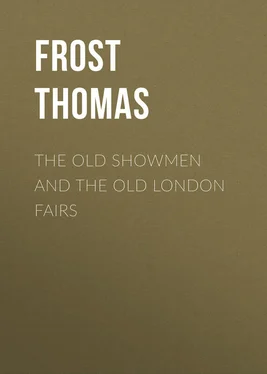Thomas Frost - The Old Showmen and the Old London Fairs
Здесь есть возможность читать онлайн «Thomas Frost - The Old Showmen and the Old London Fairs» — ознакомительный отрывок электронной книги совершенно бесплатно, а после прочтения отрывка купить полную версию. В некоторых случаях можно слушать аудио, скачать через торрент в формате fb2 и присутствует краткое содержание. Жанр: foreign_antique, foreign_prose, на английском языке. Описание произведения, (предисловие) а так же отзывы посетителей доступны на портале библиотеки ЛибКат.
- Название:The Old Showmen and the Old London Fairs
- Автор:
- Жанр:
- Год:неизвестен
- ISBN:нет данных
- Рейтинг книги:4 / 5. Голосов: 1
-
Избранное:Добавить в избранное
- Отзывы:
-
Ваша оценка:
- 80
- 1
- 2
- 3
- 4
- 5
The Old Showmen and the Old London Fairs: краткое содержание, описание и аннотация
Предлагаем к чтению аннотацию, описание, краткое содержание или предисловие (зависит от того, что написал сам автор книги «The Old Showmen and the Old London Fairs»). Если вы не нашли необходимую информацию о книге — напишите в комментариях, мы постараемся отыскать её.
The Old Showmen and the Old London Fairs — читать онлайн ознакомительный отрывок
Ниже представлен текст книги, разбитый по страницам. Система сохранения места последней прочитанной страницы, позволяет с удобством читать онлайн бесплатно книгу «The Old Showmen and the Old London Fairs», без необходимости каждый раз заново искать на чём Вы остановились. Поставьте закладку, и сможете в любой момент перейти на страницу, на которой закончили чтение.
Интервал:
Закладка:
In the succeeding reign the operation of the Vagrancy Act was powerfully aided by the rise of the Puritans, who regarded all amusements as worldly vanities and snares of the Evil One, and indulgence in them as a coquetting with sin. As yet they lacked the power to suppress the fairs and close the theatres, though their will was good to whip and imprison all such inciters to sin and agents of Satan as they conceived minstrels, actors, and showmen to be; and Bartholomew Fair showed no diminution of popular patronage even in the reign of Charles I.
“Hither,” says the author of a scarce pamphlet, printed in 1641, “resort people of all sorts and conditions. Christchurch cloisters are now hung full of pictures. It is remarkable, and worth your observation, to behold and hear the strange sights and confused sounds in the fair. Here, a knave in a fool’s coat, with a trumpet sounding, or on a drum beating, invites you to see his puppets. There, a rogue like a wild woodman, or in an antic shape like an incubus, desires your company to view his motion; on the other side, hocus pocus, with three yards of tape or ribbon in his hand, showing his art of legerdemain, to the admiration and astonishment of a company of cockoloaches. Amongst these, you shall see a gray goosecap (as wise as the rest), with a ‘What do ye lack?’ in his mouth, stand in his booth shaking a rattle, or scraping on a fiddle, with which children are so taken, that they presently cry out for these fopperies: and all these together make such a distracted noise, that you would think Babel were not comparable to it.
“Here there are also your gamesters in action: some turning of a whimsey, others throwing for pewter, who can quickly dissolve a round shilling into a three-halfpenny saucer. Long Lane at this time looks very fair, and puts out her best clothes, with the wrong side outward, so turned for their better turning off; and Cloth Fair is now in great request: well fare the ale-houses therein, yet better may a man fare (but at a dearer rate) in the pig-market, alias pasty-nook, or pie-corner, where pigs are all hours of the day on the stalls, piping hot, and would cry, (if they could speak,) ‘Come, eat me!’”
The puppets and “motions” alluded to in the foregoing description were beginning to be a very favourite spectacle, and none of the puppet plays of the period were more popular than the serio-comic drama of Punch and Judy , attributed to Silvio Florillo, an Italian comic dramatist of the time. According to the original version of the story, which has undergone various changes, some of which have been made within the memory of the existing generation, Punch, in a paroxysm of jealousy, destroys his infant child, upon which Judy, in revenge, belabours him with a cudgel. The exasperated hunchback seizes another stick, beats his wife to death, and throws from the window the two corpses, which attracts the notice of a constable, who enters the house to arrest the murderer. Punch flies, but is arrested by an officer of the Inquisition, and lodged in prison; but contrives to escape by bribing the gaoler. His subsequent encounters with a dog, a doctor, a skeleton, and a demon are said to be an allegory, intended to convey the triumph of humanity over ennui, disease, death, and the devil; but, as there is nothing allegorical in the former portion of the story, this seems doubtful.
The allegory was soon lost sight of, if it was ever intended, and the latter part of the story has long been that which excites the most risibility. As usually represented in this country during the last fifty years, and probably for a much longer period, Punch does not bribe the gaoler, but evades execution for his crimes by strangling the hangman with his own noose. Who has not observed the delight, venting itself in screams of laughter, with which young and old witness the comical little wretch’s fight with the constable, the wicked leer with which he induces the hangman to put his neck in the noose by way of instruction, and the impish chuckling in which he indulges while strangling his last victim? The crowd laughs at all this in the same spirit as the audience at a theatre applauds furiously while a policeman is bonneted and otherwise maltreated in a pantomime or burlesque. The tightness of the matrimonial noose, it is to be feared, materially influences the feeling with which the murder of a faithless wife is regarded by those whose poverty shuts out the prospect of divorce. And Punch is such a droll, diverting vagabond, that even those who have witnessed his crimes are irresistibly seduced into laughter by his grotesque antics and his cynical bursts of merriment, which render him such a strange combination of the demon and the buffoon.
The earliest notices of the representation in London of ‘Punch’s Moral Drama,’ as an old comic song calls it, occur in the overseer’s books of St. Martin’s in the Fields for 1666 and 1667, in which are four entries of sums, ranging from twenty-two shillings and sixpence to fifty-two shillings and sixpence, as “Rec. of Punchinello, ye Italian popet player, for his booth at Charing Cross.”
Hocus pocus , used in the Bartholomew Fair pamphlet as a generic term for conjurors, is derived from the assumed name of one of the craft, of whom Ady, in ‘A Candle in the Dark,’ wrote as follows: —
“I will speak of one man more excelling in that craft than others, that went about in King James’s time, and long since, who called himself the King’s Majestie’s most excellent Hocus Pocus; and so was he called because at playing every trick he used to say, Hocus pocus tontus talontus, vade celeriter jubeo – a dark composition of words to blind the eyes of the beholders.”
All these professors of the various arts of popular entertainment had, at this period, to pay an annual licence duty to the Master of the Revels, whose office was created by Henry VIII. in 1546. Its jurisdiction extended over all wandering minstrels and every one who blew a trumpet publicly, except “the King’s players.” The seal of the office, used under five sovereigns, was engraved on wood, and was formerly in the possession of the late Francis Douce, by whose permission it was engraved for Chalmers’s ‘Apology for the Believers in the Shakspeare MSS.,’ and subsequently for Smith’s ‘Ancient Topography of London.’ The legend round it was, “SIGILL: OFFIC: JOCOR: MASCAR: ET REVELL: DNIS REG.” The Long Parliament abolished the office, which, indeed, would have been a sinecure under the Puritan rule, for in 1647 the entertainers of the people were forbidden to exercise their vocation, the theatres were closed, the May-poles removed, and the fairs shorn of all their wonted amusements, and reduced to the status of annual markets.
There is, in the library of the British Museum, a doggrel ballad, printed as a broad-sheet, called The Dagonizing of Bartholomew Fair , which describes, with coarse humour, the grossness of which may be attributed in part to the mingled resentment and contempt which underlies it, the measures taken by the civic authorities for the removal from the fair of the showmen who had pitched there, in spite of the determination of the Lord Mayor and the Court of Aldermen, to suppress with the utmost rigour everything which could move to laughter or minister to wonder. Among these are mentioned a fire-eating conjuror, a “Jack Pudding,” and “wonders made of wax,” being the earliest notice of a wax-work exhibition which I have been able to discover.
Whether the itinerant traders who were wont to set up their stalls in the fairs of Smithfield, and Westminster, and Southwark, found it worth their while to do so during the thirteen years of the banishment of shows, there is nothing to show; but we are not without evidence that the showmen were able to follow their vocation without the fairs. Evelyn, who was a lover of strange sights, records in his diary that, in 1654, – “I saw a tame lion play familiarly with a lamb; he was a huge beast, and I thrust my hand into his mouth, and found his tongue rough, like a cat’s; also a sheep with six legs, which made use of five of them to walk; and a goose that had four legs, two crops, and as many vents.”
Читать дальшеИнтервал:
Закладка:
Похожие книги на «The Old Showmen and the Old London Fairs»
Представляем Вашему вниманию похожие книги на «The Old Showmen and the Old London Fairs» списком для выбора. Мы отобрали схожую по названию и смыслу литературу в надежде предоставить читателям больше вариантов отыскать новые, интересные, ещё непрочитанные произведения.
Обсуждение, отзывы о книге «The Old Showmen and the Old London Fairs» и просто собственные мнения читателей. Оставьте ваши комментарии, напишите, что Вы думаете о произведении, его смысле или главных героях. Укажите что конкретно понравилось, а что нет, и почему Вы так считаете.












